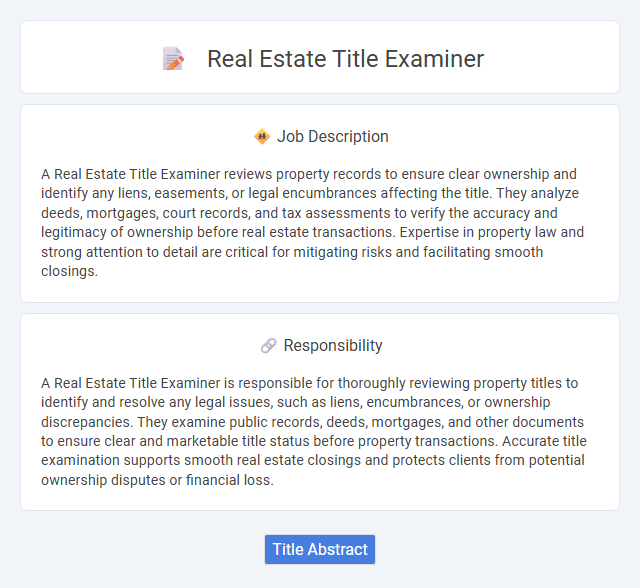
A Real Estate Title Examiner reviews property records to ensure clear ownership and identify any liens, easements, or legal encumbrances affecting the title. They analyze deeds, mortgages, court records, and tax assessments to verify the accuracy and legitimacy of ownership before real estate transactions. Expertise in property law and strong attention to detail are critical for mitigating risks and facilitating smooth closings.
Individuals with strong attention to detail and analytical skills are highly likely to be suitable for a Real Estate Title Examiner position. Those who enjoy examining legal documents and resolving complex issues related to property titles might find this job a good fit. However, candidates who prefer dynamic, client-facing roles or rapid decision-making may be less inclined to thrive in this detail-oriented, research-focused environment.
Qualification
Real Estate Title Examiners must possess a strong understanding of property law, title documentation, and lien indexing to accurately verify ownership and identify potential title defects. A background or certification in real estate, law, or paralegal studies enhances analytical skills crucial for examining public records and legal documents. Proficiency in computer databases and title search software, combined with meticulous attention to detail, ensures comprehensive title clearance for real estate transactions.
Responsibility
A Real Estate Title Examiner is responsible for thoroughly reviewing property titles to identify and resolve any legal issues, such as liens, encumbrances, or ownership discrepancies. They examine public records, deeds, mortgages, and other documents to ensure clear and marketable title status before property transactions. Accurate title examination supports smooth real estate closings and protects clients from potential ownership disputes or financial loss.
Benefit
A Real Estate Title Examiner likely offers significant benefits by ensuring property ownership clarity, potentially reducing legal risks and costly disputes. Employers may provide competitive salaries along with opportunities for professional growth in the real estate and legal sectors. The role probably includes access to comprehensive training and the chance to develop specialized expertise in title research and analysis.
Challenge
The role of a real estate title examiner likely involves navigating complex property records with a high probability of encountering discrepancies or unresolved liens, making accuracy essential. Challenges may stem from interpreting varied legal documents and ensuring clear ownership, which could affect transaction outcomes. This job may demand meticulous attention to detail and a strong understanding of local property laws to minimize risks and prevent costly errors.
Career Advancement
Real Estate Title Examiners play a crucial role in verifying property ownership and identifying potential legal issues, making attention to detail and legal knowledge essential for success. Career advancement opportunities include moving into senior title examiner roles, title insurance underwriting, or transitioning into real estate law and compliance positions. Developing expertise in local property laws and advanced title searching techniques significantly enhances promotion prospects within title companies and real estate firms.
Key Terms
Title Abstract
A Real Estate Title Examiner specializes in conducting thorough title abstracts to verify property ownership, identify liens, encumbrances, and legal limitations. Detailed analysis of public records, deeds, mortgages, and tax documents is essential to ensure clear and marketable titles. Precision in compiling title abstracts reduces risk in real estate transactions and supports smooth ownership transfers.
 kuljobs.com
kuljobs.com